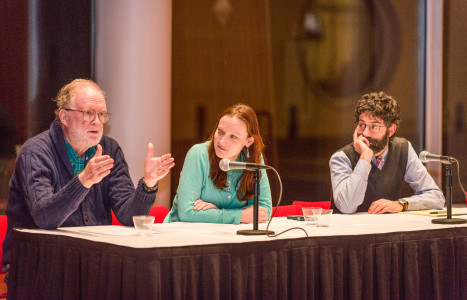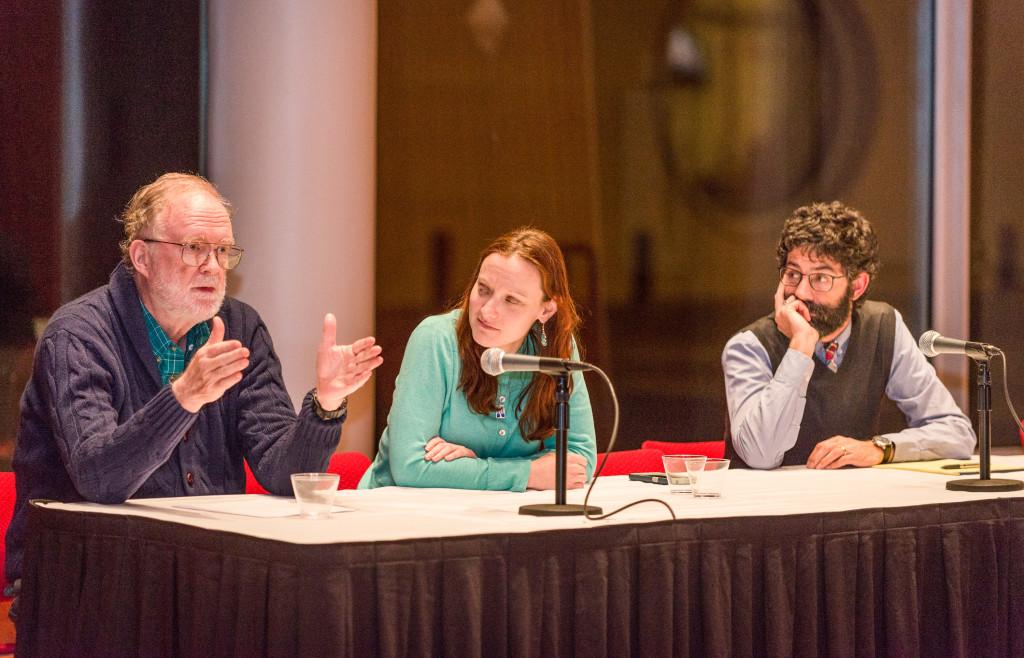On Tuesday, Jan. 27, the College’s Gates Lecture Series hosted a series of events analyzing the relationship between religion and climate change. The presentation series was organized by Grinnell’s Department of Religious Studies, beginning with a lecture from 4:15 p.m. to 5:15 p.m. by American University’s Dr. Evan Berry and concluding with a four-person panel intended to cultivate different perspectives on the subject, which began at 8 p.m. that night.
The panel was comprised of Dr. Berry, Dr. Rose Caraway from Iowa State University, David Campbell, Biology and Kalzang Bhutia, Lecturer in Religious Studies.
Caleb Elfenbein, History and Religious Studies, who helped organize the event, explained that the Gates Lecture Series “aims to bring important scholars in the field to Grinnell in part to show how the academic study of religion intersects with issues of interest to the general campus community.”
Rabbi Rob Cabelli was especially excited about the prospect of bringing four unique voices to Grinnell to mix and interact with each other.
“I think the relationship between religion, religiosity and the environment is one in a considerable state of flux right now,” Cabelli said. “As these two fields are often in opposition to each other, the importance of this lecture series to continuing the conversation surrounding religion and the environment is significant.”
Cabelli added that the timeliness of the panel was also beneficial to those who are passionate about addressing climate change.
“You’re living in the world, your lives are going to be so tremendously affected by this,” he said.
The series invited the panel discussion as a way of bringing together professors from different fields who have studied this intersection, in the hopes of highlighting the different viewpoints on the environment that religion can provide. The panelists departed from the mainstream conceptions of how climate change is treated by religion, instead seeking to highlight Mayan, Judeo-Christian and Buddhist relationships with the environment.
The examples provided by the panelists showed how religion can oftentimes be highly beneficial to the environment and work to ignite action within a community.
“We hope that people who [attended] the evening panel [gained] an appreciation of the simultaneously local and global nature of climate change and the ways that different communities grapple with its implications,” Elfenbein said.

Photo by Chris Lee
The panelists primarily focused on the field research that they had conducted on religion and climate change, as all four had considerable firsthand experience in the field, studying in places like Cuba, Belize and the Himalayas.
In sharing their unique experiences, the panelists engaged the audience with anecdotes and research on the interconnectedness of people and the land they live in.
Campbell highlighted the way that Yucatec Mayans in Belize revere the forest as part of their religion and their efforts to protect it. Caraway explained how the “Special Period” in Cuba’s history created a communal feel to farming and furthered efforts to respect the land. Berry spoke about the United States and the rise of the environmental movement in conjunction with the spirituality surrounding the environment. Additionally, Bhutia discussed Buddhist relationships with the environment and how in recent years the religion has become regarded as “green.”
Elfenbein said that in bringing together these viewpoints, he hoped that there would be an increased awareness on campus of the interdisciplinary nature of the global climate change issue, as well as our part in it.
Many attendees were impressed by the wide breadth of viewpoints and the multitude of perspectives they heard from.
“I’ve never really considered religion and the environment to come together,” said Amul Gyawali ’15.
A secondary goal of the panel was to encourage attendees to rethink the role that they play, as well as that of the College, in the future of our planet. Cabelli hopes the panel will catalyze changes that already have a great deal of support on campus.
“It’s important to know that there’s a lot of interest on campus from students as well as faculty and staff,” he said. “The future of the world is, in a certain sense, in the balance, so I think … probably the most important thing we could possibly bring, is things pertaining to the choices that we’re making.”





























































